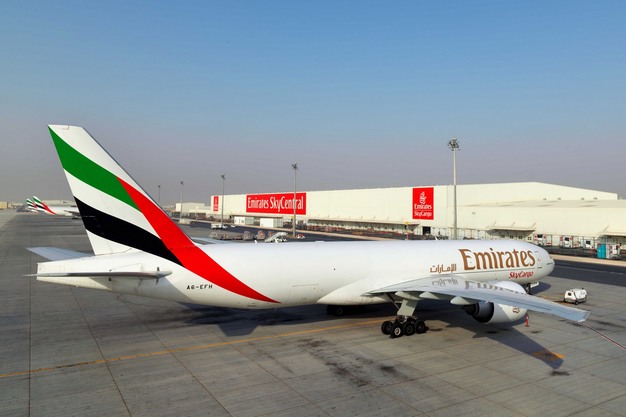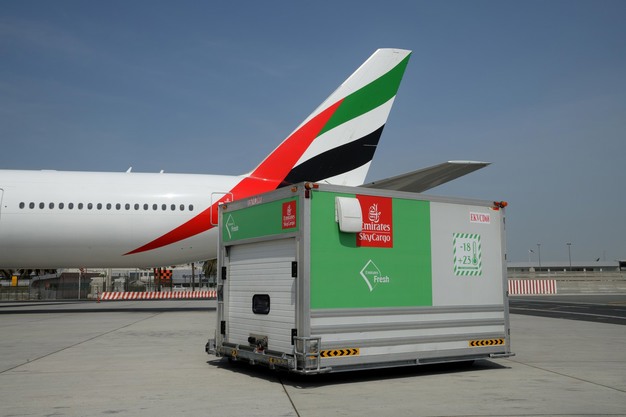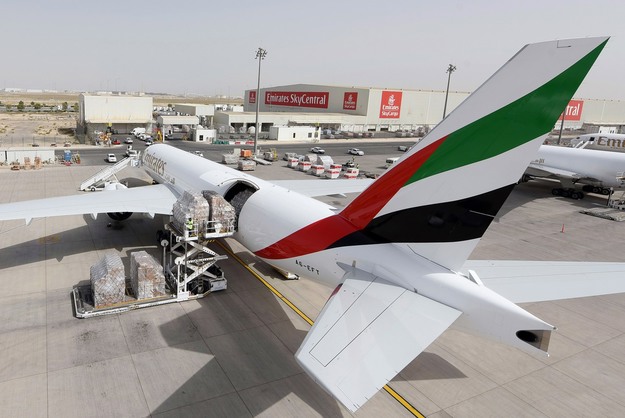With an average 900 – 1,000 tonnes travelling on Emirates flights across the world every day, perishables are Emirates' largest business unit by far. Air-freighted perishables typically consist of fruits, vegetables, seafood, meats and dairy products, as well as flowers, seeds and plants.
 "To cater to the different types of products, we developed Emirates Fresh, a three-tiered service that accounts for produce with higher tolerances right the way through to the most sensitive perishables that require end-to-end cool chain protection, including on the loading ramp. Underpinned by our advanced technology and infrastructure, we ensure that precious perishable cargo travels in a consistent environment throughout its journey, with rapid transit from farms to shops around the world in as little as 24–48 hours," explains Dennis Lister, Senior Vice President of Product and Innovation, Emirates SkyCargo.
"To cater to the different types of products, we developed Emirates Fresh, a three-tiered service that accounts for produce with higher tolerances right the way through to the most sensitive perishables that require end-to-end cool chain protection, including on the loading ramp. Underpinned by our advanced technology and infrastructure, we ensure that precious perishable cargo travels in a consistent environment throughout its journey, with rapid transit from farms to shops around the world in as little as 24–48 hours," explains Dennis Lister, Senior Vice President of Product and Innovation, Emirates SkyCargo.
Emirates have the capabilities to move perishable goods to over 140 destinations worldwide. Some of the top origin markets include the USA, Colombia, Ecuador, Australia, India, Norway, the Netherlands, Kenya, Chile and Peru, among others. There has also been a growing demand for fresh fruit and vegetables out of Southeast Asia, including Vietnam and Cambodia.

Strategic location
Dubai's strategic location serves as a vital bridge for air cargo operations between East and West and, with over 250 flights departing from Dubai every 24 hours, Emirates SkyCargo offers fast, convenient and regular schedules across continents, utilizing both dedicated freighters and the belly hold of passenger aircraft.
"Operating across a dual-airport hub in Dubai, Emirates SkyCargo has a fleet of trucks that transfer cargo between Dubai International Airport and Dubai World Central, in as little as five hours air-to-air. For temperature-sensitive products, such as fresh fruit and vegetables, we have temperature-controlled reefer trucks to maintain the shipment's integrity while in transit."
"To integrate the airports more seamlessly, we established a bonded trucking corridor, creating a rolling conveyor belt to cut down on multiple screenings and additional time spent in transit. In some markets, we provide additional services to support customers with temperature sensitive shipments, such as delivering shipments directly to warehouses, which avoids multiple handling and temperature variations. We've also extended our road feeder service in certain markets, offering temperature-controlled reefer trucks, expanding our connectivity to regional airports too."
Temperature fluctuation and environmental changes are one of the biggest vulnerabilities for perishables while in transit. Too high temperatures or humidity will accelerate decay or decrease shelf life and, if kept too cold, the cargo is at risk of chilling injury.

"To deliver freshness you can taste, we employ the right tools and operations to ensure goods are protected throughout the journey. Every perishable shipment moved under Emirates Fresh is stored in a dedicated section of the temperature-controlled warehouse and is given priority transit, including quick ramp transportation, to minimize risk.
"For more delicate shipments, such as meat, seafood or fresh-cut flowers, we utilize innovative ventilated cool dollies, which maintain the environment throughout all handling, storage and on-ground movement. Cool dollies are equipped with a temperature data logger, giving our customers complete confidence that the required temperature has been maintained at all times."
"We also provide optional add-ons for peace of mind including White Covers which are lightweight and water-resistant, shielding cargo from extreme ambient temperature, both hot and cold, while being loaded. These can be applied to shipments that have higher temperature tolerance, such as fruits and vegetables."

Peaks and troughs in demand
Air freight is traditionally cyclical in nature, where we see peaks and troughs throughout the year. However, this has been somewhat disrupted by macroeconomic and geopolitical issues and therefore it's not always easy to forecast demand.
"However, it's not just short-term occurrences that are driving change. By 2050, there will be an estimated 9 billion people on earth and the demand for fresh food will be 60% more than it is today. The supply chain and logistics network will continue to collaborate and evolve to ensure we're providing consumers with the goods that they need, when they need them."
With a vast global network of over 140 destinations across 6 continents, Emirates SkyCargo uplifts fresh produce from different countries worldwide, according to the time of year. This ensures consumers are able to enjoy their seasonal fruits and vegetables year-round.
Emirates SkyCargo has laid out an ambitious 10-year strategic roadmap that will see them double their existing capacity and add 20 new destinations to their already vast global network. This will enable them to connect the global agriculture community with their customers in all corners of the globe.
For more information:
Emilie Rose Roberts
Emirates SkyCargo
[email protected]
www.skycargo.com
